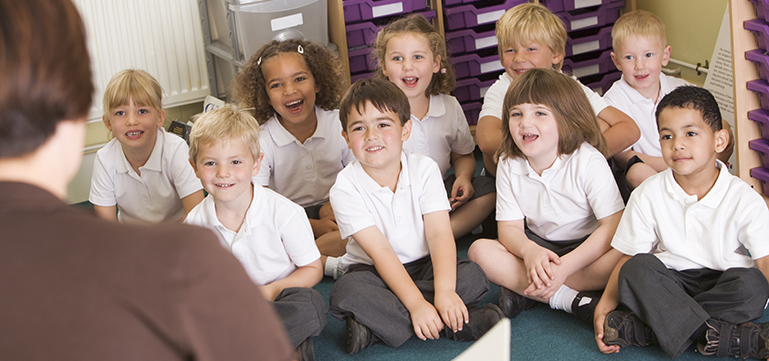School develops the pupil voice

Quick links:
Information about the school
Ysgol Dolbadarn primary school is in the village of Llanberis in Gwynedd local authority. Welsh is the main medium of the school’s life and work, and English is introduced as a subject in key stage 2. There are 177 pupils on roll, including 14 nursery-age, part-time pupils.
The average proportion of pupils that are eligible for free school meals over the last three years is approximately 8%. This is significantly lower than the national average of 18%. Around 56% of pupils speak Welsh at home. The school has identified around 31% of its pupils as having additional learning needs. This is significantly higher than the national average of 21%. Very few pupils have a statement of special educational needs. A Language Difficulties Unit, which is part of Gwynedd education authority’s provision, is located in the school.
Context and background to effective or innovative practice
For several years now, the pupil’s voice has been at the heart of all aspects of school life. This is part of the vision, and pupils, all teaching staff and governors are committed to it in order to ensure success. The school’s aim is for all pupils to take ownership of what they learn and express their views about activities outside the curriculum, for example extra-curricular activities that support and enrich school life and develop the child in full.
There are also eco groups and an active school council, where pupils are responsible for creating their own action plan. They set their own direction, organise meetings and produce their own agenda, and keep useful records of all meetings. They report back to parents, governors and the school’s staff on their findings, either by letter or through a specific meeting. A good example of their communication is when they designed a pamphlet for parents to promote the importance of attendance and punctuality. They have also presented information about the importance of walking to school and the element of child safety when walking to school. They recently decided to produce a report on the use of the Welsh language in the classrooms and on the playground, and observed behaviour in classes. Through a combination of educational and extra-curricular experiences of leading specific groups and committees, the pupil’s voice is given a prominent place at Ysgol Dolbadarn. This leads successfully to developing and deepening pupils’ knowledge, understanding and skills across the school.
Description of the nature of the strategy or activity
In terms of planning and developing their education, pupils are given regular input into the content of their themes from the nursery class onwards. By doing so, they foster a sense of ownership of their education from the outset. They choose what they would like to learn, rather than teachers elaborating too much on what they will learn. By following this philosophy, there is very strong evidence that pupils have more interest, enthusiasm and ownership of their education.
In all classes, there is a ‘learning wall’ that is full of pupils’ ideas. The contents of the wall highlight their thoughts and aspirations when planning themes and lessons. In the foundation phase, a tree is displayed in all classes that outlines pupils’ suggestions about what they would like to learn and what they understand or know about specific themes. As progression, pupils complete KWL grids (Know/Want to know/Learnt) in order to identify their previous knowledge, what they would like to know, and then what they have learned. In key stage 2, pupils’ ideas are very often pursued, which can mean that the content of learning is completely different from what was intended to be taught originally. This shows the school’s willingness to take sensible risks in order to develop an exciting curriculum for its pupils.
Pupils have developed their role in considering the response to each other’s work. They now have complete confidence in assessing their own work and that of their peers. As a great deal of modelling work by staff and peers happens continuously, pupils respond to the work through assessment for learning, by setting individual targets and success criteria independently. The process is now something that all pupils do completely naturally, which contributes to developing their knowledge and understanding, in addition to their skills.
Another system that has been established within the school is to create a one-page profile, which is a useful means of getting to know the individual and understand what is important to them. All pupils’ one-page profiles are shared following their admission to the nursery class. They are reviewed annually by the parent and child. They include questions such as ‘What is important to me? Like and admire? What is important to help me? What is important to me for the future?’ Through this simple leaflet, the pupil’s voice is once again given a specific and prominent place in their education. This makes a valuable contribution towards developing their knowledge, understanding and skills.
Since recently, the school has implemented teaching a growth mindset across the school. Although in its early stages, its implementation was pursued as a result of discussions with the school’s oldest pupils. Stars and particular colours are used to represent learning powers, and the class teacher and pupils respond to each other’s work by using colours that reflect the learning power in pupils’ work. This is a simple but highly effective way of raising pupils’ confidence in their own education.